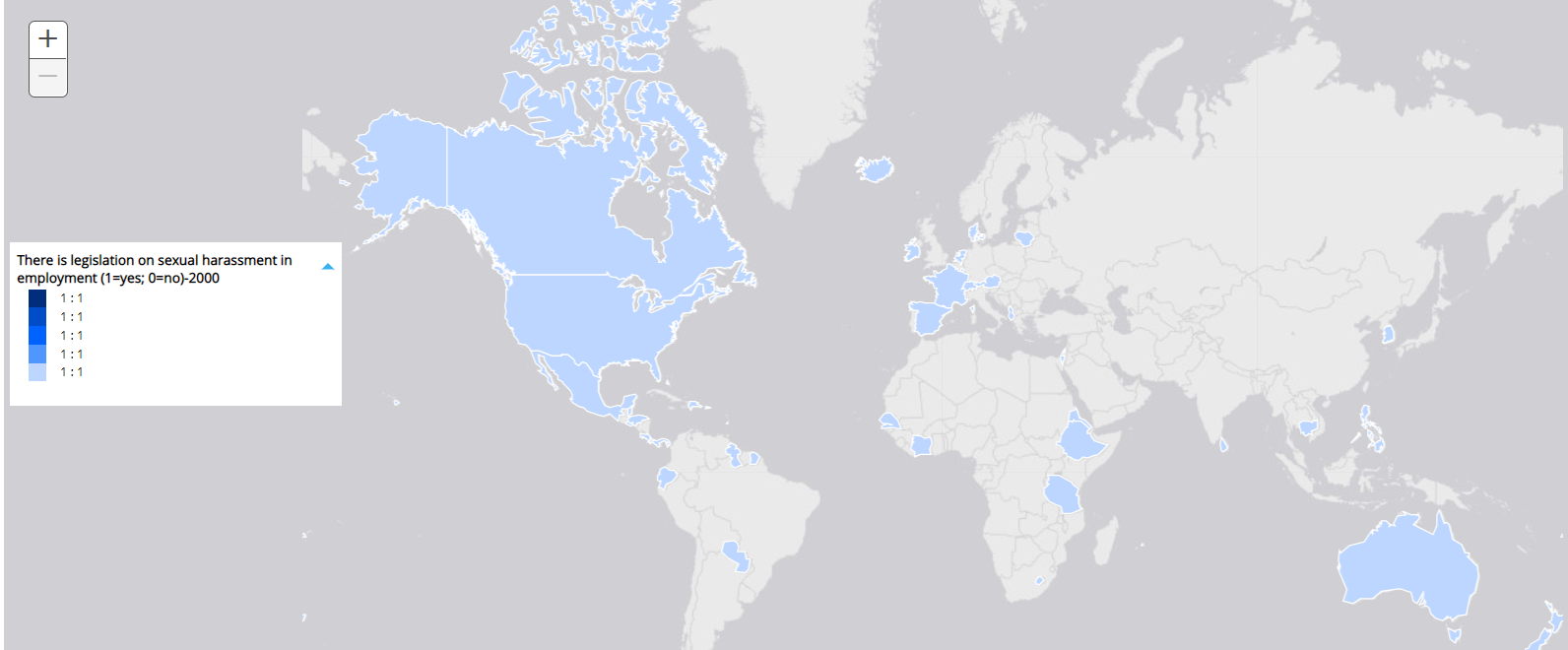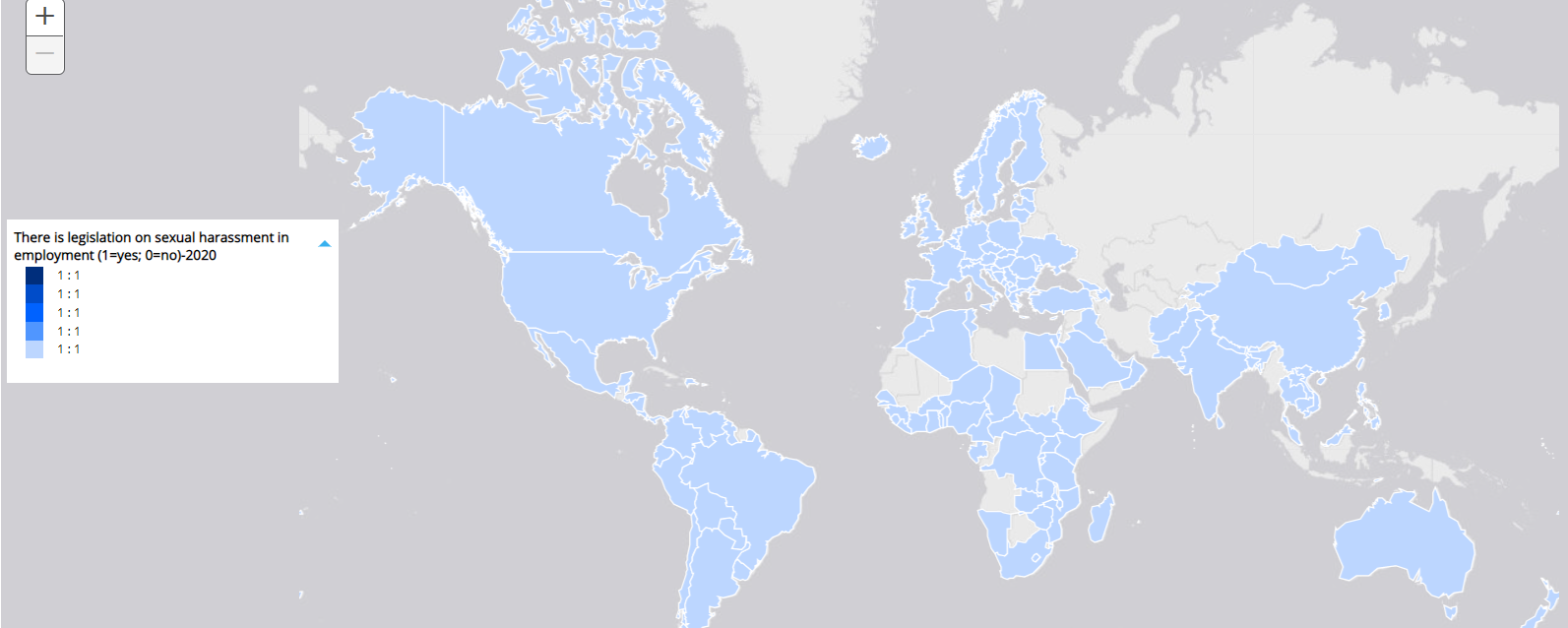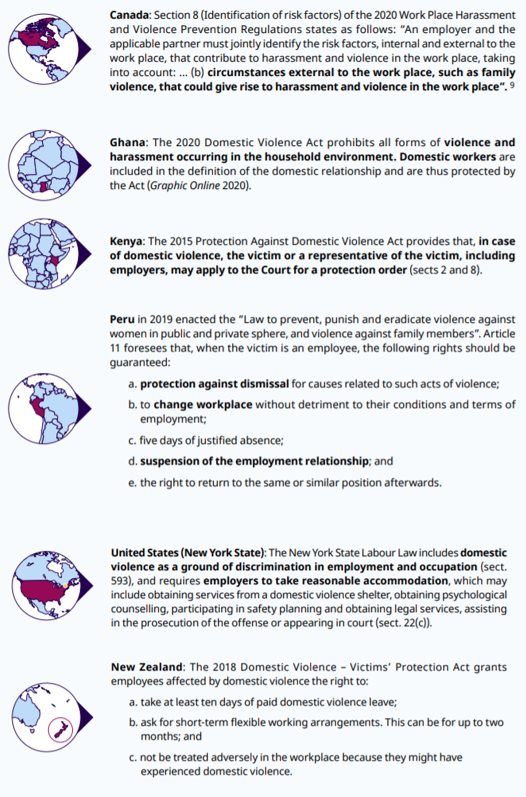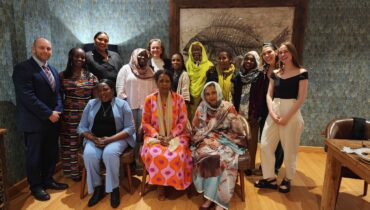The first international treaty on violence and harassment in the “world of work”—ILO Convention No. 190—came into force earlier this summer. Together with Recommendation No. 206, the Convention recognizes the right of everyone to work free from violence and harassment. According to the International Labor Organization (ILO), the “world of work” encompasses both paid and unpaid activities. Convention 190 calls on governments to adopt legislation that ensures the right to equality and non-discrimination in employment and occupation and prohibits gender-based violence and harassment.
Currently, 141 economies globally have adopted legislation covering sexual harassment in employment. This increased legal protection is relatively recent. According to Women, Business and the Law, 99 economies adopted such legislation in the last 20 years, 17 of which adopted it in the past 5 years. Between 2019 and 2020, for example, Bahrain, Djibouti, Georgia, Sierra Leone and the United Arab Emirates introduced or improved legal protections for women from sexual harassment in employment (Figure 1).
The push to fully implement and enforce these laws, however, is an ongoing struggle that has become even more urgent in the context of the global pandemic. This article identifies key gaps in the existing legal framework and urges policymakers to consider the impact of lockdowns and remote work on the prevalence of online harassment of women.
Figure 1a: Countries with legislation on sexual harassment in employment (2000)

Figure 1b: Countries with legislation on sexual harassment in employment (2020)

Despite enhanced legal frameworks, harassment at work remains widespread. In the past two years, violence and harassment in the world of work has not only failed to decline but has expanded through different means. As part of the profound impacts of the COVID-19 pandemic and social isolation measures, remote work became the new normal for many, and virtual platforms are the standard option for work meetings and communications. This shift contributed to a parallel outbreak of online sexual harassment and violence which has invaded the extended workplace at home.
Surveys in the United Kingdom and India found that last year’s lockdown exacerbated sexual harassment in the virtual world of work. And while the COVID-19 pandemic has laid bare online violence and harassment, regional and country-level studies from recent years showed similar trends. Striking as these numbers are, the abuse is highly underreported both to the online platforms or to offline protective agencies.
Figure 2. Recent Legal Reform on Workplace Responsibility for Gender Based Violence

As we begin to establish into the new normal, remote work is clearly here to stay, even if to a lesser degree than during the peaks of the coronavirus pandemic. It is more important than ever for laws to explicitly prohibit gender-based violence and harassment across all forms of digital communication and media, including as relates to the virtual world of work. Over the years, countries have increasingly adopted legislation covering cybercrimes and online violence particularly through cyber security and information technology laws, data privacy protection acts, and criminal code provisions, with some, including France, South Africa, El Salvador, and more recently Lebanon specifically criminalizing online sexual harassment. More, however, can be done.
In this context, Article 3.1 of the ILO Convention 190 is particularly welcome: “The Convention applies to violence, and harassment in the world of work occurring in the course linked with or arising out of through work-related communications, including those enabled by information and communication technologies.” Similarly, the Convention recognizes the negative spillover effects that domestic violence can have in general on the world of work, which countries’ labor and employment provisions have increasingly taken into account (Figure 2).
Convention 190 also calls for is the need to implement an inclusive, integrated and gender-responsive approach for the prevention and elimination of violence and harassment in the world of work, which includes, among others, having relevant policies and strategies in place to implement comprehensive measures, establishing or strengthening enforcement and monitoring mechanisms; ensuring access to remedies and support for victims; providing for sanctions and ensuring effective means of inspection and investigation of cases, and developing tools, training, and raising awareness, in accessible formats. Disaggregated data collection is also key to understanding and addressing the problem.
To date, seven countries have ratified the Violence and Harassment Convention 190: Argentina, Ecuador, Fiji, Mauritius, Namibia, Somalia and Uruguay. The convention becomes binding upon countries one year after adoption. While we call upon governments to adopt the Convention, we also hope to see such commitments translate into stronger legislation protecting women from violence and harassment, adequate enforcement, as well as more rigorous research on IT-enabled harassment and increased efforts around ways to mitigate this growing pandemic with enormous social, political, economic, and psychological consequence. A new pledge announced in early July by some of the world’s largest digital media platforms shows important commitments in addressing this online pandemic. Such strong and bold action by all stakeholders is needed to build back better for a world of work free from online violence and harassment.
Rangita de Silva de Alwis is a member of the faculty at the University of Pennsylvania Law School and a Hillary Rodham Clinton Fellow at the Georgetown Institute for Women, Peace and Security. Paula Tavares is a Senior Legal and Gender Specialist at the World Bank Group.


